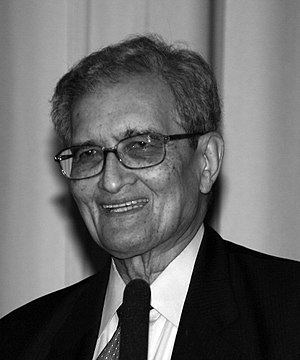 Image via Wikipedia
Image via WikipediaThe distinction between these approaches is really a device used by Sen to present his own approach in contrast primarily to that of John Rawls. It would require a different posting to assess how accurate an account Sen gives of Rawls. Since, however, the real basis of Sen's specific response to Rawls is given in Chapter 2 of The Idea of Justice I would like to leave discussion of that for another occasion.
The point I wish to assess in this posting concerns the accuracy of Sen's classifying of Kant as part of the tradition of what he terms "transcendental institutionalism" (or TI for short). The approach is traced back to Hobbes and Rousseau and is claimed to have two distinct features. The first is a concentration on "perfect justice" as opposed to relative comparisons of justice and injustice. This has the following result:
The inquiry is aimed at identifying the nature of 'the just', rather than finding some criteria for an alternative being 'less unjust' than another. (6)
The second feature is a primary focus on getting institutions right as opposed to focus on "actual societies" and in making this second move TI requires some "specific behavioural assumptions". After making this initial characterisation of TI Sen goes on to claim that this approach, initiated by Hobbes, was pursued later also by Locke, Rousseau and Kant and in the latter case he specifically cites the Metaphysics of Morals though in a fairly old translation and without discussing any of the secondary work done on Kant's political philosophy and its relationship to his moral philosophy.
The prime purpose of Sen's characterisation of TI is, as he goes on to make clear, a response to what he takes to be important contemporary claims in political philosophy but he has clearly thought it nonetheless important to trace TI as emergent from a definite lineage of political thought. The subsequent analysis provided of TI argues that it goes wrong in assuming that it is either necessary or sufficient to arrive at some decisive principles of justice that are supposedly uniquely "impartial" in their appeal.
Now the main point I want to make here is that Sen's characterisation of the tradition of TI goes seriously wrong in its picture of Kant's political philosophy. Firstly, Kant does not, in the Doctrine of Right, focus on "perfect justice". In fact Kant is very far from having such a focus as is made manifest in Religion within the Limits of Reason Alone where the notion of a "kingdom of virtue" is distinguished sharply from a political state of affairs and the attempt to collapse the distinction between the two is also sharply criticised by Kant in Perpetual Peace.
The outline of the Doctrine of Right is focused on providing a basic condition of a political state that matches what Kant terms the demands of "strict right". It is precisely because these demands are quite different from those of "virtue" strictly speaking or the following in political life of some strict adherence to Kant's moral theory that some recent commentators on the Doctrine of Right have come to the conclusion that the philosophy elaborated there does not belong within the province of Kant's practical philosophy at all. Whilst this reaction also strikes me as wrong it is a more reasonable response than the view provided by Sen of Kant's political philosophy.
The second feature of Sen's account, the emphasis on "institutionalism" does describe correctly some features of Kant's view though it still fails to acknowledge the importance of his analysis of "private right" or the distinction between this and "public right". The emphasis on "actual societies" in Sen's own story is meant to address the way that behaviours are not simply derived from institutions but also shape and drive the ways in which the latter manifest themselves. Similarly the discussion of private right in Kant is meant to show that there is a region of life that has its justification separately from the justification that can be given of the state and whose normative validity hence is of a different sort. So whilst Kant does emphasise "institutions" he does not take them all to be simply part of the "social contract" in the sense of having their validity bestowed on them by the province of the state. In this respect, in fact, Kant shares some common ground with both Locke and Hobbes (and all of them are here different from Rousseau).
Sen's primary reason for drawing the distinction between TI and his own "comparative" approach is to argue for the need to think about situations as "more or less" just. However precisely this recognition of the need for such a notion is at the heart of Kant's own theory as Kant recognises well the various ways in which states fail to achieve the distinction of being completely republican and uses the notion of the republic as a critical device that helps to enable us to understand the different ways in which things are "more or less" just. So it is a clear disservice to discussion at least of Kant's theory to pit the concentration on institutions that emerges from his political theory against a comparative analysis of societies (further it is not clear that is helpful with Rawls either though that would be another story).
The critical reasons for Sen's analysis hence do not cut against the way that Kant's own theory is structured. This theory does not attempt to describe a "perfect" society and is not guilty of neglect of "comparative" analysis but does describe institutions primarily (not, however, entirely from the standpoint of the normative validity of the state) and has, from this analysis, a critical tool that enables further assessment of "degrees" of justice and injustice.

No comments:
Post a Comment